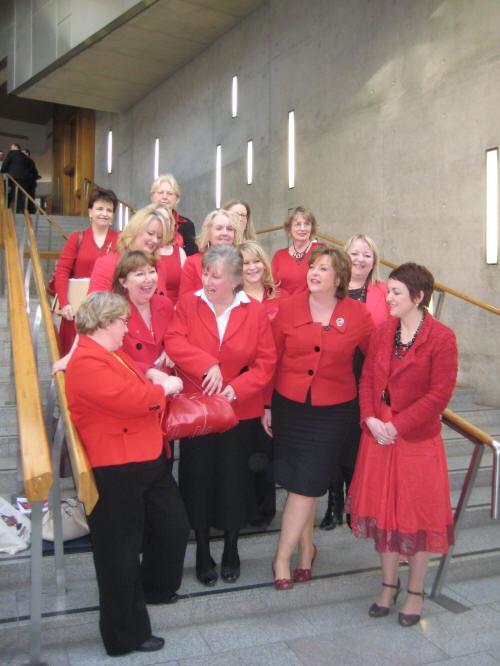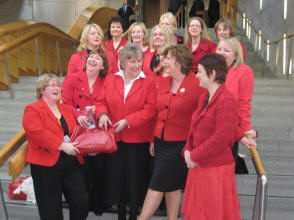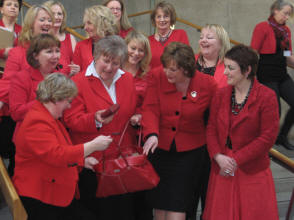Women
and Politics
Bless the creation of Sky+ -
that’s what I think. I never get to see much TV
and when I do want to see something I’m generally too
busy or too tired at the time it’s normally aired so the
record function on Sky+ lets me record the things I
really want to see and I can watch them when I have a
spare few minutes. Last week, then, after a long
Monday followed by an evening meeting, I got home, got
my shoes off, brewed up a cuppa and sat down in front of
the telly to watch Mo – the story of Mo Mowlam.
Although her politics and mine are
slightly different, I always had a lot of respect for
her and for the work she did in
Northern Ireland. Julie
Walters delivered a very realistic depiction of Mo and
demonstrated the strength of character and the famous
(or perhaps infamous) negotiating tactics she deployed
to bring about peace in Northern Ireland. I don’t
compliment the Conservatives very often, but I believe
that John Major and his Government deserve an awful lot
of credit for the work they did in seeking to address
the issues and bring about peace. It was their
efforts that meant that the scene was set for Mo Mowlam
barrelling into office in 1997 and shaking up politics
in the six counties. That combination was the
bedrock of the peace deal and the rejuvenation of
Stormont.
Perhaps that strength of
character, the determination, the principles and the
battling will of Mo Mowlam would have acted as a brake
on the rush to war in
Iraq and Afghanistan had she still
been in cabinet when those momentous decisions were
taken. Would the voice of Mowlam have acted as the
conscience of the collective? Robin Cook, we know,
ended his political career on the rocks of principle in
opposition to the Iraq war and it may seem a bit daft
for me to think that Mo Mowlam could have made the
difference but I have the feeling (as always, I suppose)
that the bow-wake of a powerful woman often carries more
before it than you would expect and that Mo’s influence
within the cabinet might have been enough to turn away
from war. We’ll never know, of course, but we’re
all free to speculate.
Having sorted out Monday so well,
I wasn’t giving up on Tuesday. Back home late
after meetings and I could sit down to watch
Mrs Mandela. I was
fascinated by the influences, the pressures that created
the driven woman that Winnie Mandela became. The
obscene treatment by the then South African authorities
of those who opposed them politically, the sheer
brutality and inhumanity of that treatment was shameful.
Winnie Madikizela Mandela was subjected to that,
including the obscene use of sexual violence. When
her husband was sentenced to life imprisonment at
Rivonia trial Winnie vowed to carry on the struggle and
she suffered as a result. Tortured by Swanepoel,
tested by the Soweto riots and banished to a distant
township, she stood up against her oppressors and
refused to buckle, moving herself back to Soweto and
calling for revolution – most infamously in Musieville
with the proclamation that “With our necklaces we shall
liberate this country”. Her soaring examples of
leadership and drive for justice were blackened by the
controversy over the goings-on and rumours at the
Mandela United Football Club. They were
extraordinary times and it is probable that this
extraordinary woman did some extraordinary things – and
it’s not beyond belief that she may have broken some
laws other than the apartheid laws.
Nelson
Mandela from prison cell to president talked of
forgiveness and he was the best beloved of the
anti-apartheid movement. Winnie Mandela, a single
mother as a result of Nelson’s imprisonment and a woman
targeted for special treatment by an oppressive regime,
talked of burning car tyres around the necks of traitors
and freeing her people. Her passion ignited the
movement and her presence energised it time after time.
Winnie Mandela was Malcolm X to Nelson Mandela’s Martin
Luther King.
So what, you might ask, has all
this to do with Scottish politics? Well, women in
politics have a strength of character and a
determination to change the world for the better.
Sometimes that goes a bit awry as in the Mandela United
episode, but it is usually enormously positive.
Today in the Scottish Parliament, women from all sides
of the chamber turned out dressed in red. Ignoring
the obvious comments about Butlins, we cam together in
common cause to keep the crisis that remains in Haiti at
the front of people’s minds, to make sure that it
doesn’t slip away down and out before we’ve done what we
can to help that country back on its feet.



It happened today in the Scottish
Parliament that women from all sides came together in
common cause, and it happens fairly often – on asylum
issues, on many immigration issues, trafficking,
international development, and so on. We take our
responsibility to speak for
Scotland very seriously indeed and
the caring and compassionate nature of our nation shines
through in these collective actions. We don’t
agree with each other on everything, but where we find
common cause we’re a force to be reckoned with.
Enough of this cooperation!
Education Committee this week started its enquiry into
local government spending on education. We had the
Government’s officials in for a little light grilling
and they managed to return fire with masses of detail –
apparently all easily recovered from memory – and seemed
very much in command of their subject matter (in this
case, how we finance local government). It’s
interesting that, even three years into the new way of
working, some opposition politicians still can’t accept
that we now have a trusting relationship with councils –
we don’t tell them what to do and they don’t need to
seek our agreement, the world has moved on. Like
any relationship there are tensions, but the Scottish
Government will not seek to micro-manage councils the
way that the previous Ministers did. Not only is
there no need, it’s counter-productive.
Wednesday afternoon was in the
chamber for the third budget of the SNP Scottish
Government. Remember in our first year in power
some people were saying that we’d be out by Christmas?
Well, even after the massive cuts from the London
Treasury and the by now traditional teenage temper
tantrum from Labour MSPs, there was John Swinney in
total command in the chamber, a tour-de-force, tasking
unpopular decisions, weighing how best to spend the
limited resources we have for the benefit of the
country. In the end Labour MSPs voted against the
budget, Lib Dems abstained, the Conservatives and the
Greens backed the SNP – and we’ve got another budget
done, another year started, another ratchet forward in
making Scotland
better. As George Foulkes once said – we’re doing
it on purpose!
Thursday gave us more chamber time
– stage 3 of the Marine Bill had 123 amendments to
consider and a fair number of the votes were fairly
tight. We had twitchy whips on all sides making
sure that we were all in the chamber and ready to vote
on each batch of amendments. Stage 3 of a
Bill is always a ‘stay in
or near the chamber all day’ type thing. On normal
business days we can sit in our offices working and keep
up with the debates on the internal television service.
On stage 3 days, however, there are votes going on
fairly regularly and you have to be able to get back
into the chamber, get your pass into the voting terminal
and cast your vote, so there’s no chance of getting
through constituents’ emails, catching up on research,
writing letters, or any of the many other things that we
normally get up to on plenary days.
I have to dash off now, I’m ‘swanning
off’, as my delightful and dedicated staff term it, to
the Scotswoman of the Year awards in
Glasgow. Another chance to
celebrate powerful women in politics, in housing, in
voluntary work, in policing, and so on, so it’s gladrags
on time – the sacrifices I make, and what a country we
have full of fantastic women!

